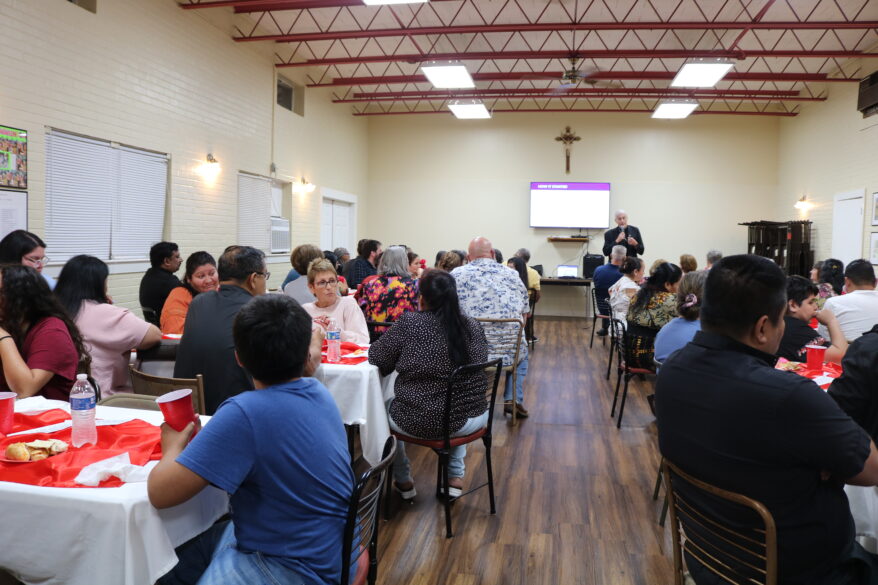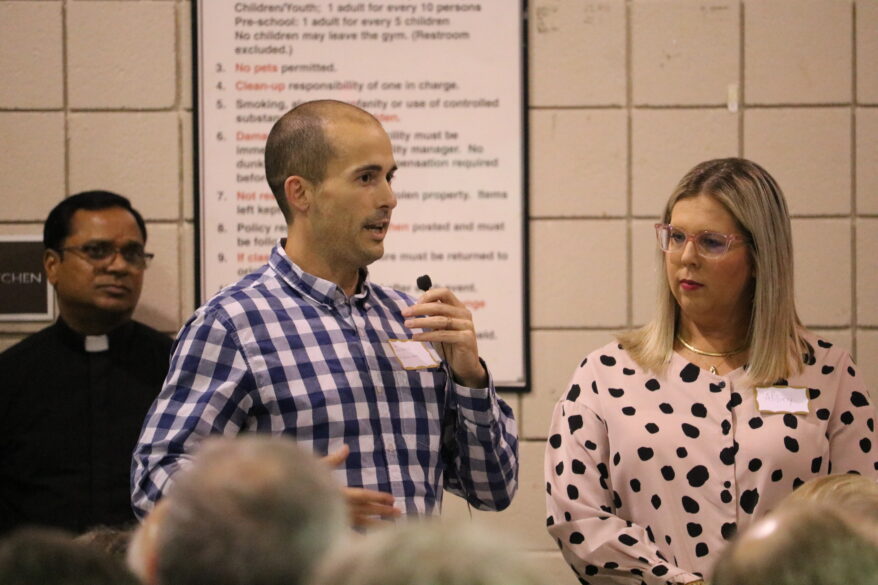By Joanna Puddister King
JACKSON – The year-long pastoral reimagining process undertaken by the Diocese of Jackson continues with a period of discernment by Bishop Joseph Kopacz before concluding with a pastoral letter.
Spreading across five major phases, that included establishing pastoral reimagining committees, parish assessments, reviewing data on diocesan demographics by the Center for Applied Research in the Apostolate (CARA) and pastors, deacons and LEMs meeting; phase three just concluded with Bishop Kopacz visiting each deanery to celebrate a Mass of Thanksgiving and meet with key people who worked on the pastoral reimagining process for each parish.

In the month of March, priests, deacons and LEMs of each deanery of the diocese were asked to discuss the responses from the reimagining process from the parishes. Some of the questions discussed were what areas they saw growth; what challenges are associated with that growth; what areas of ministry are diminishing; what are the challenges with this decline; and what areas need greater collaboration with the Chancery offices.
After deanery meetings, Bishop Kopacz traveled to each deanery for a special Mass of Thanksgiving, celebrating “Eucharist and conversation,” with those who worked on the Pastoral Reimagining process in their respective parishes. Though each gathering had varied responses, they all were asked the questions: Where do we go from here? How do we animate and foster the growing edges? How do we address the challenges?
Across each deanery many highlighted the growing Hispanic population and raised questions as to how to serve the population faithfully and effectively, a sentiment Bishop Kopacz highlighted in meeting with priests during phase two of the reimagining process.
“I’m grateful to a number of our parishes that have opened up with inviting the Hispanic population through having Mass and liturgy. It’s just amazing to see the growth.”
After assessing needs through the Reimagining process, Father Manohar Thangundla of St. Francis of Assisi parish in Brookhaven recently added a weekly Spanish Mass on Saturdays to accommodate increasing numbers of Hispanics in the area. Additionally, he began learning Vietnamese to hold a monthly Mass for that growing community, as well.
Bishop Kopacz says that almost 30 of the diocese’s 72 parishes offer Mass in Spanish.
“It’s about bringing people into the community at a deeper level, but the challenge is the literacy [of our priests.] … Becoming confident enough to offer the Mass, even if you can’t preach the homily in Spanish,” said Bishop Kopacz.
“We have priests in the diocese who are bilingual and many who are willing to learn to celebrate the sacraments, so people can have that experience.”
Raquel Thompson, director of Hispanic ministry at St. James Tupelo, said that she and the parish’s director of faith formation, Rhonda Swita, are working to band together Hispanic and White communities, with the premise – ‘we are better together.”
“She [Swita] is working to create more activities we can do as families together. … So, we’ll be one whole Catholic Church,” said Thompson.
“We are one body of Christ, and no matter what language we speak, we have to be kind, respectful and have love for each other.”
As for additional challenges and fostering growth, many of the deanery gatherings brought up the availability of activities and involvement of youth and young adults in their respective communities, with an emphasis on having adults getting their children involved in the church community.
Lauren Codding, who served on the Pastoral Reimagining committee for St. Alphonsus McComb and attended the phase three session with Bishop Kopacz for deanery two, said that during the committee’s assessment, they identified faith formation for youth and young adults as an area for improvement.
“We want to start providing faith formation to our young adult community, so that they feel welcomed, and we can build community among that age group. Our hope is that they will start bringing their children to church and we can in turn feed the children through religious education,” said Codding.
The parish also hopes to start a campus ministry program to reach young adults at McComb’s local community college.
Campus ministry is an initiative that others around the diocese voiced during Reimagining sessions to reach the young adult demographic. In a proactive response to the growing demand for more opportunities for young adults, the diocese inaugurated its Office of Young Adult and Campus Ministry in 2022. This effort was in response to the Synod on Synodality process, where the diocese heard concerns on evangelization to young adults.
“This is a ministry that will continue to grow as we make additional efforts in our parishes to reach our growing edges,” said Bishop Kopacz.

A third area discussed at many of the deanery community gatherings for the Reimagining process is the importance of a sense of community and inviting non-Catholics to learn about the church.
Several parishes mentioned during various deanery gatherings that small faith communities have been successful in encouraging lifelong friendships and a sense of strong faith. Others, like Isaac Blakemore of St. Francis Madison, who just came into the church at Easter Vigil, felt that as Catholics we need to understand our faith and have the courage to share it with the community.
As a former ordained Methodist minister, Blakemore was drawn to the Catholic Church by the sacraments. He told members of the deanery one gathering at St. Francis Madison that when he received the Eucharist for the first time, it was like someone had him in on a secret.
“One thing I think all parishes could do is … to just be proud of what the Catholic faith offers and share it,” said Blakemore. “If you do believe that indeed this is the one, true church, you ought to believe that the Holy Spirit can move even through someone that is just a layperson. You can invite someone into learning about the Catholic faith … and be willing to discuss it.”
Phase four of the Pastoral Reimagining process is currently underway with Bishop Kopacz in a season of discernment, allowing time for the drafting of a pastoral letter to the people of God in the Diocese of Jackson.
When asked about the overall Reimagining process, Bishop Kopacz explained that it unfolded in stages due to its organic nature, rooted deeply at the grassroots level.
“We asked parishes to do their best thinking, reflecting and praying,” said Bishop Kopacz. “Focusing on the specifics of their settings and how to move forward in the context of the whole diocese and with the support and encouragement of the bishop’s office and the chancery.”
He plans to keep his pastoral letter as brief as it can be, but still have it substantial enough to address key areas of growth and concern.
“I see my ministry … as to keep mining and plowing this field; and seeing what we can do and how we can assist one another to make it happen on a local level; and with and through the diocese,” says Bishop Kopacz.
